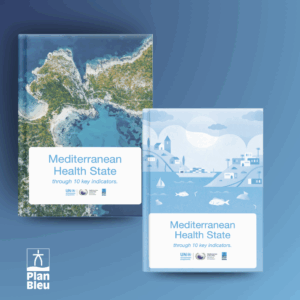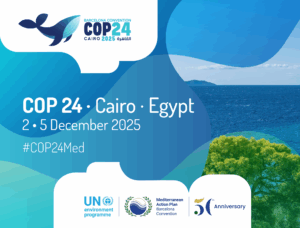The Peer Review Meeting is the culmination of the streamlined peer review process of National Sustainable Development Strategies (NSSDs) as defined by the methodology agreed with the Contracting Parties of the Barcelona Convention and the MAP system, as part of the implementation of the Mediterranean Strategy for Sustainable Development (MSSD) 2016-2025.
The SIMPEER has three main phases, the first being analysis of the documents and reference frameworks for sustainable development in the countries, the second being consultation and collaboration with stakeholders during a mission that takes the project team to the participating countries, and the third being the Peer Review phase itself.
The Peer Review meeting for the SIMPEER 2018-2019 exercise was therefore held in Marseille, on 19 and 20 November 2019. It was hosted by Marseille City Hall in the prestigious Salle des Mariages, where the countries participating in this exercise, Albania and Tunisia, met the countries that participated in the previous exercise, France and Morocco. Egypt and Montenegro were unfortunately unable to attend this meeting due to administrative and scheduling constraints.
In the first part of the Peer Review meeting, participants were able to assess the efforts made by France and Morocco to implement the recommendations made by the Peers at the previous review meeting, held in Nice in April 2017, and the progress made by the two countries in implementing their National Sustainable Development Strategy (NSSD).
The second part was devoted to the presentation of the interim national reports from Albania, Tunisia and Egypt. The presentations were followed by lively discussions that helped identify recommendations to answer the questions raised by the countries in their national reports, with respect to the five dimensions of the SIMPEER analysis. These recommendations are included in the final version of the country reports that will be posted on Plan Bleu website after validation by the countries.
In addition, the meeting included a discussion session on common issues emerging in the three countries, such as decentralisation and the role and capacity of local governments in the implementation of NSSDs in general and natural resource governance in particular, as well as mobilisation of the private sector in the implementation of sustainable development and the capacity of civil society to play a full role alongside the public sector.
These questions and the responses given to them are included in the final report for both SIMPEER exercises, 2016-2017 and 2018-2019. The final report also contains a summary of the Peer discussions on the contribution of the Mediterranean regional dimension to the implementation of sustainable development in the current climate, affected by changes in the global framework and worldwide commitments (SDGs, Paris Agreement, MEAs, Green Economy, Blue Economy, etc.). These reflections could be helpful during the mid-term evaluation work on the MSSD 2016-2025, scheduled for 2020.












